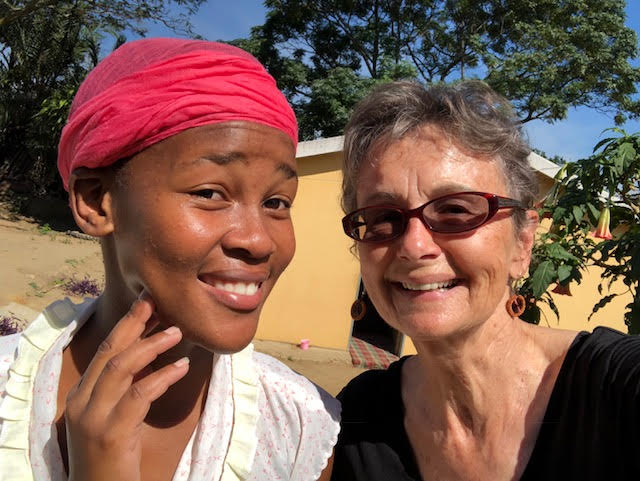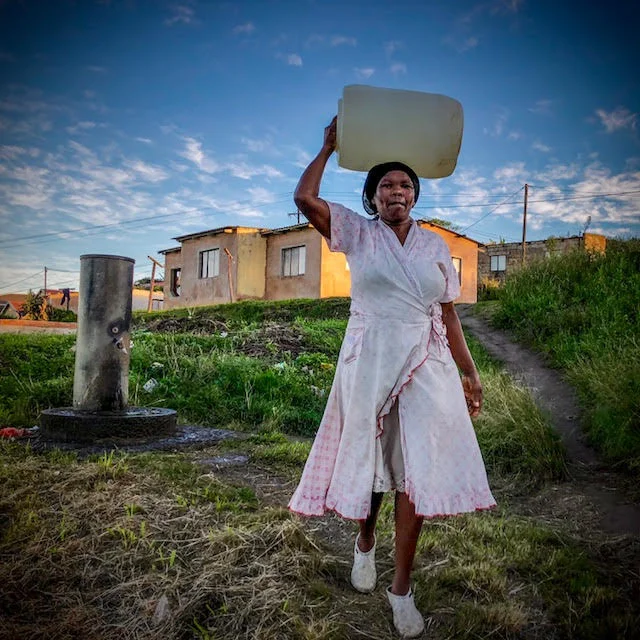At the neighborhood water spigot by my homestay in the countryside of Zulu Land in South Africa, I found an unlikely spot to make friends.
I was talking to young Thandeka—who lived nearby and was carrying six large buckets to her house—when she turned to speak with an elderly gentleman I had already met a little way up the trail. We had shaken hands and chatted, as much as possible with no common language, for he spoke only Zulu.
“Who is that?" I asked after he left.
“Oh that was Mistapha.”
A few repetitions later, I realized she was saying Mister Hlophe, and that he was her grandfather.
“But what do you call him in your language? Do you say grandfather?”
“Oh, I call him Mkhulu. That is grandfather in Zulu,” she explained. “Do you speak Zulu?“
I concentrated, wanting to get the one word I knew correct.
“Crick!” I said. Her eyes opened wide, and I repeated: “Crick.”
She confirmed that I had said ‘piss off’ with a hand motion, then roared with laughter.
“Do you know any more?”
“Anything more polite, you mean?” I asked. “No.”
We almost rolled over laughing, which was serious, as she was carrying 25 liters of water—which weighs two pounds a liter—in a yellow bucket on her head.
The next morning at six I went to bring her a gift, one of the little flashlights I carry with me on trips. I found her at home, already washing clothes, but happy to take a break and take a selfie with me—only after she wrapped her hair in a pink cloth, of course.
A selfie with Thandeka
We were surrounded by dirt hills that jagged down to the creeks which wove their way throughout the territory. Rugged dirt tracks wound around where possible. Driving to nearby Sangoma Zulu’s house later that day, we wandered for 20 minutes by car so I could find the turquoise rondavels two minutes walking from the spigot, just beyond the drivable track where it dropped to a small stream that I could cross. Homes were scattered about and mostly in some stage of repair—or disrepair. Thatch roofs were transformed to metal, round structures replaced rectangular ones, and goats and chickens ran around.
On my way home, passing the water spigot, I met Daphne, a 54-year-old, just as effortlessly flipping about 50 pounds of water onto her head as young Thandeka had. I couldn’t resist another conversation, and then wanted to give her a light as well. I had to follow her home to do that as she was quickly on her way.
She said she didn’t mind if I walked home with her, but warned me it was “not very nice.”
The quality of her home was hardly the issue, as she walked far past Thandeka’s house, then veered off on a narrow trail to the right. It sloped gently at first, then grew rough, watermarked, and steep. The issue was whether I could follow her or would slip and break my leg. She kept laughing and talking, then stopping and turning around, heavy bucket swaying, to make sure I was surviving. I was determined to persist and finally made it to the bottom.
She again veered to the left, but paused to point out a concrete structure off to the right.
“Soon that will be my new home.”
“Really?“
“Yes,” she said proudly. “The government is building it for me.”
We didn’t get to pursue the subject, as she crossed a swampy spot with a few boards and quickly reached her current home. It was a small and crowded old whitewashed rectangle with a metal roof. I met her husband, who sat on their narrow bed eating an ear of dried corn and some maize, and the grandchild who sat on a cot across from him. Neither rose to help with her load. She was terribly excited and tried to get her three daughters to join us, but they were in bed behind a small door and couldn’t be bothered to get up, in spite of her repeated attempts.
Her son, a handsome young man we had met outside, came inside to chat. He was wearing a US Polo Association T-shirt whose incongruity with the scene made me visualize a lady in the South shoving unused clothing into her church’s contribution basket, shaking her head at the waste of this nearly new item sitting in her son’s drawer. I doubt she could envision its final resting place, but it was certainly appreciated here.
Daphne joined her husband on the bed so I could take a picture of them, but it felt very stiff. Looking for a laugh, I tried my Zulu on him.
“Crick,” I said. They both roared with laughter.
Daphne and her husband cracking up when I said “piss off“ in Zulu
I couldn’t quite believe that this worked every time, but it sure did the trick. We talked a bit more, then I needed to get back to my breakfast.
When I was ready to leave, Daphne came with me, telling me she had one more water container to bring from above.
Daphne carries water back to her home.
We talked about her life, and I learned that she brings all the water that the family needs. She cooks all the food. She shops for it. She cleans the house. She washes the clothes. She feeds the chickens.
“What does everyone else do?” I asked.
“Sometimes they help.”
“I bet it’s not very often,” I said, jokingly, but I was not really joking. She sheepishly confirmed they didn’t help very often. But she never stopped smiling and laughing as we continued up the steep hill, having this discussion. There was no time for self pity with Daphne; just time to care for her world.
“Does your husband work?” I asked.
“No, there are no jobs.” At this, she did look sad.
“Do your daughters or your son work?” They were all adults in their 20s and 30s.
“No, there are no jobs.”
I wondered briefly why young Thandeka could carry six pails of water and wash clothes while Daphne’s daughters lounged about, but I had to let it go.
As we passed her new house, I learned that the government builds houses for people who cannot afford to buy them. She had signed up six years earlier for the program, that it would have two bedrooms, a living room, a kitchen, and a bathroom. It would be finished in a few months, and she was very excited about the move. We would see a fair number of these standard homes in our travels, and I got familiar with their layout.
I was her first American and she asked about my husband and children and grandchildren. She hoped I liked her country. Unlike me, she was too circumspect to poke questions at my lifestyle, and I was too embarrassed at the differences in our circumstances to elaborate. But I plunged recklessly ahead with my own questions.
“Will you have water in the new house?” I almost hated to hear the answer.
“No,” she said.
“I’m sorry ...”
“But,” she quickly interrupted. “I am saving money and will run a pipe from the spigot to the house.”
“Do you have a job?” As no one else worked, I had assumed she didn’t either.
“Yes, I take care of the old people.” She had a government job at the home for the elderly, walking and taking one of the pervasive mini cab taxis for almost an hour each way to work.
“So you do everything in your house, you take care of everyone, and you have a job. The only job.”
“Yes ma’am,” she beamed.
All too soon for me, we were back at the spigot.
“This gift is tiny,” I said, handing her the small strong light.
She fingered the light, pointed at a dark corner, and said, “It’s tiny, but it’s not a small gift.”
I decided I had to help get that water to a spigot in her house.
The second time I approached the narrow trail down that steep slope to her house, I couldn’t make it even part way. My fear of falling increased with every step. Finally, I stopped just below the top of the hill and shouted her name several times. She appeared from the house and sped towards me. I asked if she would walk up the hill. A huge smile accompanied her “of course!”
She sped up to the top of the hill and we hugged. I slipped money into her hand. She saw only one of the denominations and burst into tears. So did I. We hugged again. And again.
I made her promise me two things. One, that she would tell no one of my gift, and two, that she would make her children work.
She promised she would.
I made her repeat the second promise.
In my mind’s eye I see Daphne, still making breakfast and doing laundry while her family complains about the lack of opportunity. Not much has changed, except water runs from the tap inside the house, saving her an hour daily of risky climbing and backbreaking labor as she grows older.
I regret only that I didn’t give her something more.
A goodbye hug with Daphne.



